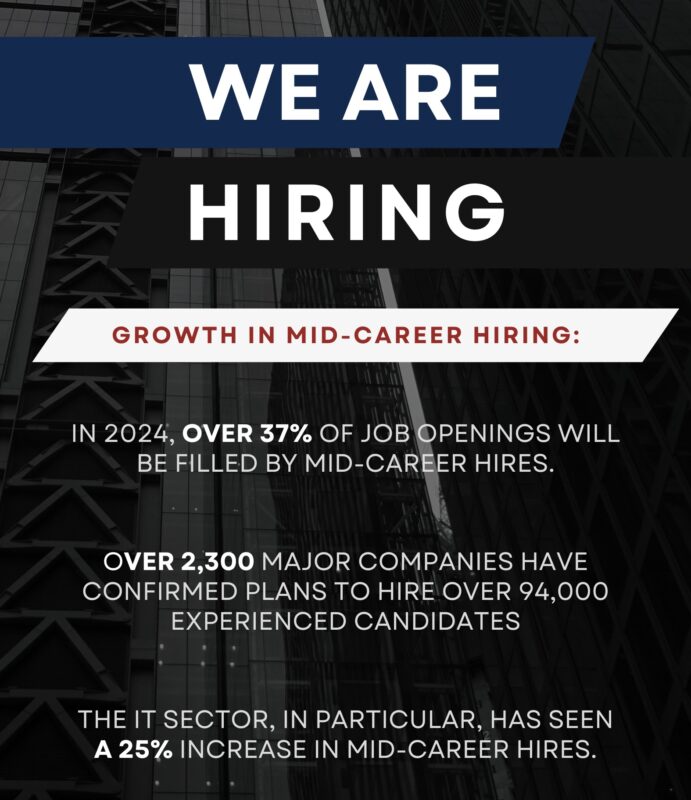Mid-career Hiring is Becoming the New Normal for Corporate Japan

Driven by changes in the business landscape, demographics, employment regulations, and pressure for more flexible work styles post-pandemic, mid-career hiring in Japan is reaching record levels, and set to keep on rising.
According to a survey by the Nikkei, over 37% of job openings are expected to be filled by mid-career hires in the fiscal year through to March 2024. More than 2,300 major companies responded, saying that they will hire a total of more than 94,000 experienced candidates. In non-manufacturing sectors, the proportion of mid-career hires is set to hit nearly 40%, according to the same survey.
The story told of lifetime employment in Japan was always an oversimplification, some would say a myth. Nevertheless, fewer Japanese traditionally job hopped, particularly those in large organisations, compared to their contemporaries in countries at similar stages of economic development. But a major shift is now underway.
Welcome to the new working week
More data on these trends are now available in part because companies with more than 300 employees have since April 2021 been required to disclose the proportion of their mid-career hires. This change, an amendment to the Employment Insurance Act, is one of the government measures intended to boost labour market flexibility.
Another significant initiative is the new ‘reskilling to change jobs’ programme offering an average subsidy of up 240,000 yen for people to retrain, with the aim of encouraging 330,000 workers to find new positions over the next three years and thus lift overall productivity in the economy.
The Japan Business Federation (Keidanren) is also on message, last year recommending its member companies boost opportunities for change by “creating environments conducive to independent career development,” and “expanding the number of positions available to mid-career and experienced workers.”
Sectors that cut staff during the pandemic, such as hospitality and travel, are running large-scale recruitment drives targeting experienced workers, but the trend goes far beyond that bounce back. Japan’s big three megabanks are planning to take on 2.5 times as many mid-career professionals this year compared to 2019, many for specialist back-office roles in areas like sustainability, IT and cybersecurity.
The Information and Communication Industry Association of Japan (CIAJ) published a study in October on human resources in the IT industry covering the first half of this year, and reported a 25% increase in mid-career hires in the sector. Leading Japanese tech corporations are increasingly recognising the potential of mid-career hires to bring fresh ideas and international perspectives to their organisations. In contrast, the stability once valued by both employers and employees is now often being seen by both sides as stifling innovation and personal growth.
Innovation and change
Other sectors where adapting to changes is essential are also witnessing sharp upticks in the number of experienced workers being newly hired, including management consultancy, life sciences and energy.
Helping personnel and companies adapt to change is at the core of management consultancy, and so firms that specialise in navigating change need to themselves be flexible and be able to offer a wide range of perspectives, something that requires an experienced and diverse workforce.
Similarly, fields that evolved rapidly such as life sciences also require specialist skills that may not always be readily available in the fresh graduate pool. Therefore, tapping into the experience of mid-career workers has become a strategic necessity for many companies in the sector in Japan, which are actively working to attract professionals with expertise in areas such as IT, clinical research, regulatory affairs, drug development and expanding overseas operations.
The offshore wind sector, another growth area with demand for specialist skill sets, is also focused on hiring experienced workers, with engineers and project managers in particularly high demand.
Further propelling the sea change in the corporate world has been the way the pandemic and its aftermath gave an unplanned boost to flexible work practices, and becoming a catalyst for some to reevaluate their attitudes to jobs that leave little time for life beyond the office. There is growing recognition from employers that they are now in competition for workers who are less inclined to sacrifice themselves on the altar of blind company loyalty.
And as Japan’s demographics continue to squeeze the talent pool, experienced, mid-career candidates will find themselves in demand more than ever.
By: Gavin Blair
We are currently searching for:
•Bilingual IT Professionals
•Bilingual Life Science Professionals
•Bilingual Energy Industry Professionals
•Bilingual Management Consultants
•Bilingual Accounting & HR Professionals
To find out more about hot roles please contact us at +81-3-5962-5888 or email us at info@slate.co.jp

